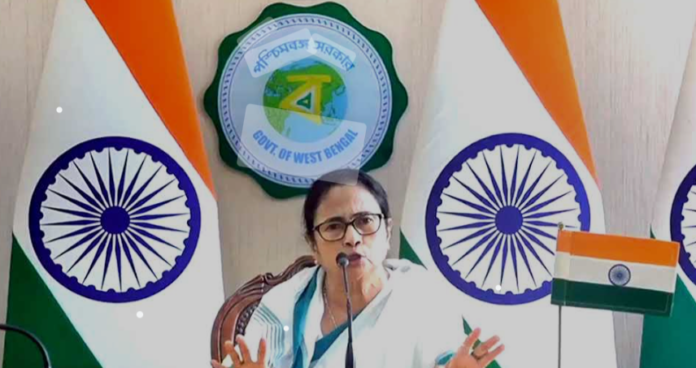Amit Pandey

In a significant development, Central Agencies have finally gained custody of Bengal’s Tamur Lung, a notorious and cruel emperor from Mangol. Lung is widely known for ravaging numerous villages and districts and vandalizing kingdoms with his sword. His reign was marked by a relentless disregard for human civilization. Seikh had done such a nasty which condemned is less than he did. We never thought that any could do this so relentlessly in this democracy with the help of political goons, though they have a place in democracy in the Assembly and Parliament, the biggest organisation of the democracy but they couldn’t be treated as a leader because of their deeds.
The Mamata government has been accused of neglecting the concerns of its voters while unabated tyranny continues under its administration. Many victims have claimed that their residences were demolished by ruling party members and land was looted through political machinations. However, it is crucial to note that Sheikh, a prominent figure in the Mamata government, is the root cause of this face of oppression. To understand the gravity of the situation, let us recall a similar incident involving the RJD government in Bihar. During their reign, countless complaints were filed against the government, leading then-Prime Minister Atal Bihari Vajpayee to question the government’s legitimacy. However, Professor Ajit Kumar Mehta, an MP from Samastipur, refuted these claims, suggesting that they were attempts by opposition forces to defame a secular government. Eventually, the truth prevailed, and the RJD lost power in 2005.
The Mamata government has actively sought to obstruct the court’s decision regarding Sahajahan. Their resistance to handing over his custody to the central agencies raises questions about their motives and intentions. Do they lack faith in the abilities of the central agencies, or do they want to conceal information from the public? The answer remains unknown, but it is essential to look at past behaviour for insights. During the reign of the Left Front in West Bengal, the TMC, as an opposition party, frequently demanded CBI inquiries into various matters. However, they were told that the CBI could not be deployed for every demand, given its nationwide responsibilities. Nonetheless, after gaining power, the TMC hypocritically criticized the central agencies. This demonstrates that regardless of the ruling party, the character of the government remains the same.
After a long struggle, the residents of Sandeshkhali can finally breathe a sigh of relief. Central Agencies now have the custody of Seikh, a symbol of tyranny and oppression. The actions of the Mamata government and its attempts to hinder justice raise concerns about their motives and transparency. Our democracy must uphold the principles of justice and integrity, ensuring that no individual or party can act as an emperor at the expense of the people.
The land acquisition conflicts in Singur, Nandigram, Keshpur, and Pingla are significant events in West Bengal’s history, reflecting the complex interplay of political power, economic development, and social justice.
Singur became a flashpoint in 2006 when the West Bengal government, then under the Left Front, sought to acquire land for Tata Motors’ Nano factory. This move was met with fierce opposition from local farmers and political activists, including Mamata Banerjee, who was at the forefront of the protests. The agitation highlighted the plight of farmers who feared losing their livelihoods and underscored the need for fair compensation and rehabilitation.
Nandigram Witnessed even more intense unrest in 2007 over the proposed acquisition of land for a chemical hub by the Indonesian Salim Group, part of a Special Economic Zone (SEZ). The protests turned violent, resulting in the tragic loss of lives and raising questions about the state’s approach to development and the use of force against its citizens.
In Keshpur and Pingla, similar disputes arose over land acquisition, often leading to violent confrontations and political turmoil. These incidents have been emblematic of the broader resistance against land expropriation without adequate safeguards for those affected.
Mamata Banerjee’s role in these movements was pivotal. Her relentless opposition to the land acquisition policies of the Left Front government resonated with many who felt marginalized by the state’s development agenda. Her rallying cry for “Ma, Mati, Manush” (Mother, Motherland, and People) became synonymous with the struggle for the rights of the landowners and the dispossessed.
Banerjee’s ascent to the Chief Minister’s office in 2011 marked a significant shift in West Bengal’s political landscape. However, her tenure has not been without controversy. Critics argue that while she opposed land acquisition as an activist, her government has faced similar challenges and criticisms, suggesting that the dynamics of power and governance often lead to complex scenarios, irrespective of the party in charge.
The history of these land acquisition conflicts in West Bengal is a testament to the ongoing struggle between development objectives and the protection of individual rights. It serves as a reminder of the delicate balance that needs to be maintained between progress and the welfare of the people.
The political landscape of West Bengal has been shaped by a complex history of leadership and allegations. From the era of J. Jayalalithaa in Tamil Nadu, whose tenure was marred by corruption charges, to the rule of Mayawati in Uttar Pradesh, where her governance was noted for a higher GDP growth rate and fewer crimes compared to previous regimes, each leader has faced unique challenges.
In West Bengal, Mamata Banerjee’s leadership has been scrutinized for alleged associations with controversial figures and for not taking stringent actions against accused party members. The legacy of Budhadeb Bhattacharya’s tenure as Chief Minister is also mixed, with significant industrial land acquisition agitations marking his time in office.
The Trinamool Congress (TMC) has been accused of harbouring individuals like Arabul Islam and Anubrata Mondal, who have faced various allegations. The intervention of central agencies has led to the arrest of some of these figures, raising questions about the governance in the state.
Despite these contemporary issues, West Bengal has a rich history of resistance and revolution. Freedom fighters like Khudiram Bose, Binoy-Badal-Dinesh, Surya Sen, and Matangini Hazra are celebrated for their valiant stand against colonial rule. These figures symbolize the state’s enduring spirit of protest and the fight against oppression.
Reflecting on this dichotomy, one can draw from the ideologies of these freedom fighters, who believed in the power of collective action and moral fortitude. Their lives remind us that governance should be rooted in the welfare of the people and the upholding of justice, ideals that are as relevant today as they were during their fight for independence.
The political climate in West Bengal is currently tense, with the state government facing challenges over the handling of Sheikh Shahjahan’s case. Chief Minister Mamata Banerjee’s previous successes in navigating through political storms involving high-profile scams like Narada, Saradha, Rose Valley, and MPS Ponzi schemes are well-documented. However, the recent allegations of assaults and public humiliation have added a new dimension to the political discourse. The resilience of the Bengali populace, known for its rebellious spirit, suggests that the unfolding events around Sheikh Shahjahan will not be overlooked easily, and the demand for accountability and justice may intensify in the coming days. The situation underscores the complex interplay between state politics and central agencies, reflecting the ongoing struggle for power and governance in the region. The spirit of freedom and democracy is not a mere chapter in history; it is a living movement that must be nurtured and protected with vigilance and integrity.


